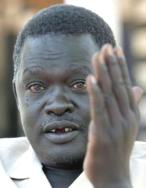FEATURE- Hopes for Sudan peace tempered by distrust
By Katie Nguyen
 RUMBEK, Sudan, May 2 (Reuters) – Daniel Deng Mondyit, a 57-year-old rebel commander in southern Sudan, wants peace with the government — but not at any price.
RUMBEK, Sudan, May 2 (Reuters) – Daniel Deng Mondyit, a 57-year-old rebel commander in southern Sudan, wants peace with the government — but not at any price.
Stretched out under a mango tree in the town of Rumbek, he insists there will be no nostalgia for the treks through the bush in search of the enemy, the clatter of machineguns, the killing.
“I have had enough of it,” the soldier said. “I’m very hopeful the present talks will end in a meaningful peace deal.”
Deng’s two missing front teeth mark him as a Dinka, a tribe that has traditionally formed the backbone of the Sudan People’s Liberation Army (SPLA). For 21 years the rebels have battled for greater autonomy from the Arabic-speaking Islamist government in Khartoum.
An estimated two million people have been killed by the fighting and another four million forced from their homes.
If peace talks between the two sides in neighbouring Kenya succeed in finding an end to Africa’s longest-running civil war, Deng said he plans to retire and enjoy the rest of his life.
But echoing the sentiments of many in the rebel stronghold of Rumbek, he suggested lasting peace can only be won if the war’s end means the south eventually gains its independence.
“Because of the bloody war we have fought, the length of time it has taken and the destruction of the south, I personally would vote for a separate Sudan, so that never again will my grandchildren go to war,” he said.
The warring factions have already agreed that after a six- year transition period southerners will have the right to vote on secession, and that they will be exempt from Islamic law.
They have also signed accords on security and how to share the wealth from the country’s oilfields.
INTERNATIONAL APPEAL
A tatty Sudanese flag hangs limply over Rumbek’s Freedom Square, where local officials have built a small stand to host officials from the capital Khartoum if an accord is signed.
Deng, who is also acting governor of Bahr el Ghazal province, said that he had taken up arms against the government because it had neglected and exploited the south.
“It is an Arab, Muslim Sudan which leaves no place for non- Muslims and non-Arabs,” he said. “I am not an Arab, I am not a Muslim. I cannot content myself with second or third-class citizenship in the country of my birth.”
Like many southerners, he insisted that any deal to end the war must be policed by a muscular U.N. peacekeeping mission.
“We would like the international community to get involved with peacekeeping because we do not trust the government of Khartoum to respect what is in the deal,” he said.
The commander said his sons and daughters have fought on the SPLA frontlines, although he refused to say how many. Dinka custom has it that to reveal the number of children in a family could provoke the gods to take one away.
As he spoke, a handful of SPLA members wearing old camouflage uniforms strolled past brick buildings ruined by Antonov bombing raids.
Apart from Deng’s young bodyguard, armed with a worn AK-47 and the commander’s black briefcase, few firearms are on display in the town.
But the SPLA is not yet ready to hand over its cache of weapons. Disarmament is not on the cards without a peace deal.
Uppermost in the minds of many southerners is the breakdown of a deal that ended Sudan’s first civil war in 1972.
A government order to redeploy army units in the south to the north was considered a violation of the peace agreement, and the move sparked a mutiny that bred the SPLA.
Distrust and a sense of grievance still run deep.
“We’ve had experiences of agreements reached and dishonoured. We want the involvement of the international community, we need international guarantees,” Deng said.
MORE THAN ONE FRONT
Fighters like Peter, another SPLA veteran, have long shed their dark green uniforms.
Pulling up his frayed shirt sleeve to show the thick dark welt of a bullet wound, and pointing to another on his upper lip, he said he wants peace.
“But if Khartoum breaks the deal — pow pow,” Peter said, hopping from one callused foot to the other, his sinewy outstretched arms brandishing an imaginary rifle.
“We will not be taken,” he said, his runny eyes hardening.
Deng said that despite the misgivings of many southerners, he believes a return to war is unlikely in the region, where the fighting has paralysed the economy and destroyed the will of the people to cultivate land or build schools and hospitals.
“I don’t think (the government) will really see the benefit in war, because this time they are going to have more than one front,” he said, referring to a separate rebel insurgency in Sudan’s western region of Darfur.
But he said that regardless of what was agreed at the peace talks, it would not be easy to persuade the SPLA to disarm.
“People involved in war for 20 years are more in love with their arms,” he said. “You need to convince them to leave their weapons by offering something else to make a living.”
